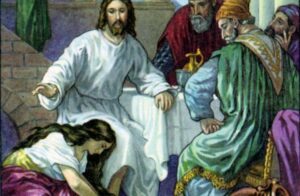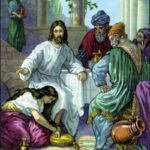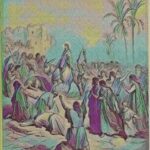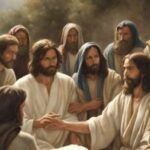John Chapter 12:1-50 King James Bible KJV

Mary Anoints Jesus, The Triumphal Entry, the Coming of the Greeks and Jesus’ Announcement of His Death, Jesus’ Final Public Teaching
John Chapter 12:1-50 King James Bible KJV. John Chapter 12 transitions from the miraculous raising of Lazarus in John 11 to the final events leading to Jesus’ crucifixion. This chapter contains rich theological themes, including worship, sacrifice, humility, and the foreshadowing of Jesus’ death and its purpose.
Key Themes
- Extravagant Worship and Sacrifice: Mary’s anointing of Jesus with expensive perfume symbolizes the depth of devotion and willingness to sacrifice for Jesus. Worship here is expressed in costly devotion, illustrating a heart aligned with love and reverence for God.
- The Nature of Jesus’ Kingship: The Triumphal Entry portrays Jesus as a humble, peaceful king, signifying that his kingdom is spiritual rather than earthly. His mission is to bring salvation through sacrifice, contrasting with the crowd’s expectations of a political savior.
- The Necessity of Jesus’ Death for New Life: Jesus’ metaphor of the grain of wheat demonstrates that true fruitfulness and life come through sacrifice, specifically his death. This teaches that genuine life requires a form of dying to oneself, a central theme of Christian discipleship.
- Human Unbelief and the Cost of Faith: Despite Jesus’ miracles, many people, including religious leaders, refuse to believe in him. This unbelief reflects the human tendency to resist God due to fear, pride, or societal pressures.
- Jesus’ Unity with God and His Mission to Save: Jesus’ final teaching affirms his unity with the Father, emphasizing that his words bring eternal life. He presents himself not as a judge but as a savior, urging people to accept the light he offers to escape spiritual darkness.
John Chapter 12:1-50 King James Bible KJV
—————-

Mary Anoints Jesus – verses 1-11
Six days before Passover, Jesus is in Bethany, where Lazarus, Mary, and Martha host a dinner in his honor. During the meal, Mary anoints Jesus’ feet with expensive perfume, wiping them with her hair. This act shows Mary’s deep devotion, recognizing Jesus’ worthiness of extravagant honor.
Judas Iscariot, Jesus’ future betrayer, criticizes her for wasting something valuable that could have been sold to help the poor. Jesus, however, defends Mary, saying, “She has kept this perfume for the day of my burial.” This anointing not only foreshadows Jesus’ impending death but also establishes a key theme: the true worship of Jesus sometimes requires extravagant love, sacrifice, and devotion. Mary’s act symbolizes a heartfelt acknowledgment of who Jesus is and a prophetic preparation for his burial.


The Triumphal Entry – verses 12-19
As Jesus enters Jerusalem, a large crowd greets him with palm branches, shouting, “Hosanna! Blessed is he who comes in the name of the Lord!” This is often called the “Triumphal Entry” and fulfills the Old Testament prophecy of the coming of a humble king (Zechariah 9:9). Jesus rides into Jerusalem on a donkey, a symbol of peace rather than conquest, contrasting the image of a militaristic leader. The crowd expects a political or military savior, but Jesus is coming as a humble servant, signaling a different kind of kingship.
This scene introduces the concept of Jesus’ kingdom being spiritual and not earthly. Jesus is presented as a messianic king whose victory will come through sacrificial love rather than force.

The Coming of the Greeks and Jesus’ Announcement of His Death – verses 20-36
Some Greeks, likely Gentile converts to Judaism, wish to see Jesus. Their arrival symbolizes the widening impact of Jesus’ ministry beyond just Israel to the Gentile world. Jesus responds by saying, “The hour has come for the Son of Man to be glorified.” Jesus then teaches about his coming death, using the metaphor of a grain of wheat. He says that unless the grain falls to the ground and dies, it remains alone, but if it dies, it produces much fruit. This illustrates how his death will bring life and growth to many. Jesus speaks openly about his struggle, saying, “Now my soul is troubled,” and asks for God’s name to be glorified. A voice from heaven responds, affirming that God has glorified it and will glorify it again, emphasizing that Jesus’ sacrifice is part of God’s plan for salvation.
This section points to the self-sacrifice required for spiritual fruitfulness and the cost of true discipleship, with Jesus as the ultimate example of dying to self for the benefit of others.

Unbelief Among the People – verses 37-43
Despite witnessing many miracles, many people still do not believe in Jesus. The Gospel writer connects this to Isaiah’s prophecy, explaining that the people’s unbelief fulfills Scripture, showing the hardening of their hearts. This passage reflects the reality that people’s response to Jesus is a matter of the heart and that even seeing miracles doesn’t guarantee faith. John explains that those who love human praise more than God’s approval are especially hindered from truly believing in Jesus.
This theme of unbelief highlights the persistent divide between those who accept Jesus as the Messiah and those who reject him, often out of fear or loyalty to societal expectations.


Jesus’ Final Public Teaching – verses 44-50
In his final public address, Jesus summarizes his mission: to reveal the Father, offer salvation, and bring light to a dark world. He states that anyone who believes in him is actually placing faith in God who sent him, affirming his unity with the Father. Jesus emphasizes that he did not come to judge the world but to save it. He clarifies, however, that those who reject him will face judgment based on his words, which are from God himself. He closes by reiterating his obedience to God, highlighting that his message offers eternal life to those who believe. This teaching reinforces Jesus’ role as the divinely sent Savior whose words are life-giving but also come with a call to account.
John Chapter 12:1-50 King James Bible KJV
1 Then Jesus six days before the passover came to Bethany, where Lazarus was which had been dead, whom he raised from the dead.
2 There they made him a supper; and Martha served: but Lazarus was one of them that sat at the table with him.
3 Then took Mary a pound of ointment of spikenard, very costly, and anointed the feet of Jesus, and wiped his feet with her hair: and the house was filled with the odour of the ointment.
4 Then saith one of his disciples, Judas Iscariot, Simon’s son, which should betray him,
5 Why was not this ointment sold for three hundred pence, and given to the poor?
6 This he said, not that he cared for the poor; but because he was a thief, and had the bag, and bare what was put therein.
7 Then said Jesus, Let her alone: against the day of my burying hath she kept this.
8 For the poor always ye have with you; but me ye have not always.
9 Much people of the Jews therefore knew that he was there: and they came not for Jesus’ sake only, but that they might see Lazarus also, whom he had raised from the dead.
10 But the chief priests consulted that they might put Lazarus also to death;
11 Because that by reason of him many of the Jews went away, and believed on Jesus.

12 On the next day much people that were come to the feast, when they heard that Jesus was coming to Jerusalem,
13 Took branches of palm trees, and went forth to meet him, and cried, Hosanna: Blessed is the King of Israel that cometh in the name of the Lord.
14 And Jesus, when he had found a young ass, sat thereon; as it is written,
15 Fear not, daughter of Sion: behold, thy King cometh, sitting on an ass’s colt.
16 These things understood not his disciples at the first: but when Jesus was glorified, then remembered they that these things were written of him, and thatthey had done these things unto him.
17 The people therefore that was with him when he called Lazarus out of his grave, and raised him from the dead, bare record.
18 For this cause the people also met him, for that they heard that he had done this miracle.
19 The Pharisees therefore said among themselves, Perceive ye how ye prevail nothing? behold, the world is gone after him.

20 And there were certain Greeks among them that came up to worship at the feast:
21 The same came therefore to Philip, which was of Bethsaida of Galilee, and desired him, saying, Sir, we would see Jesus.
22 Philip cometh and telleth Andrew: and again Andrew and Philip tell Jesus.
23 And Jesus answered them, saying, The hour is come, that the Son of man should be glorified.
24 Verily, verily, I say unto you, Except a corn of wheat fall into the ground and die, it abideth alone: but if it die, it bringeth forth much fruit.
25 He that loveth his life shall lose it; and he that hateth his life in this world shall keep it unto life eternal.
26 If any man serve me, let him follow me; and where I am, there shall also my servant be: if any man serve me, him will my Father honour.
27 Now is my soul troubled; and what shall I say? Father, save me from this hour: but for this cause came I unto this hour.
28 Father, glorify thy name. Then came there a voice from heaven, saying, I have both glorified it, and will glorify it again.
29 The people therefore, that stood by, and heard it, said that it thundered: others said, An angel spake to him.
30 Jesus answered and said, This voice came not because of me, but for your sakes.
31 Now is the judgment of this world: now shall the prince of this world be cast out.
32 And I, if I be lifted up from the earth, will draw all men unto me.
33 This he said, signifying what death he should die.
34 The people answered him, We have heard out of the law that Christ abideth for ever: and how sayest thou, The Son of man must be lifted up? who is this Son of man?
35 Then Jesus said unto them, Yet a little while is the light with you. Walk while ye have the light, lest darkness come upon you: for he that walketh in darkness knoweth not whither he goeth.
36 While ye have light, believe in the light, that ye may be the children of light. These things spake Jesus, and departed, and did hide himself from them.

37 But though he had done so many miracles before them, yet they believed not on him:
38 That the saying of Esaias the prophet might be fulfilled, which he spake, Lord, who hath believed our report? and to whom hath the arm of the Lord been revealed?
39 Therefore they could not believe, because that Esaias said again,
40 He hath blinded their eyes, and hardened their heart; that they should not see with their eyes, norunderstand with their heart, and be converted, and I should heal them.
41 These things said Esaias, when he saw his glory, and spake of him.
42 Nevertheless among the chief rulers also many believed on him; but because of the Pharisees they did not confess him, lest they should be put out of the synagogue:
43 For they loved the praise of men more than the praise of God.

44 Jesus cried and said, He that believeth on me, believeth not on me, but on him that sent me.
45 And he that seeth me seeth him that sent me.
46 I am come a light into the world, that whosoever believeth on me should not abide in darkness.
47 And if any man hear my words, and believe not, I judge him not: for I came not to judge the world, but to save the world.
48 He that rejecteth me, and receiveth not my words, hath one that judgeth him: the word that I have spoken, the same shall judge him in the last day.
49 For I have not spoken of myself; but the Father which sent me, he gave me a commandment, what I should say, and what I should speak.
50 And I know that his commandment is life everlasting: whatsoever I speak therefore, even as the Father said unto me, so I speak.
You must be logged in to post a comment.